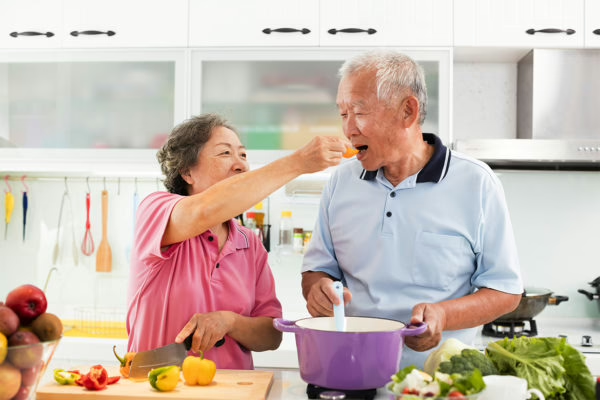Best Foods To Eat During And After Chemotherapy/Radiotherapy | The TCM Way

Link copied! Chemotherapy and radiotherapy are the two most common cancer treatments based on Western medicine. Though effective, these treatments are also known to cause serious side effects on the human body, some of which manifest in the form of hair loss, fatigue, dry skin, and mouth ulcers. Other serious long-term side effects include damage to important organs in our body, such as the heart, kidneys, reproductive organs, and nerve endings. These side effects may be so debilitating that it prevents patients from completing their cancer treatment. However, there are many ways to alleviate the side effects of cancer and its treatment, one of which is through food! Today, we share some of the best foods to eat during and after chemo- and radiotherapy from a Traditional Chinese Medicine (TCM) perspective. How conventional treatments work Simply put, both radio- and chemotherapy treat cancer by killing the cells that grow and divide quickly in the body. However, this process does not discriminate between cancer and healthy cells — normal cells are also destroyed in the process. From a TCM perspective, such damage to healthy cells results in the deficiency of the body’s Qi, Blood, Yin, and Yang. As such, it is essential for cancer patients to adopt a diet and lifestyle that can help alleviate these deficiencies and boost the body’s immune system. TCM Approach to Cancer and Food For Cancer Patients https://youtu.be/ii7OFzuGlfg TCM’s approach towards cancer management is a personalised one which takes into consideration the type and stage of the cancer, the type of western treatment used, and the general body constitution of the patient. Hence, it is best for all cancer patients to consult a licensed TCM practitioner for a treatment and diet plan tailored to their specific needs. That being said, there are still some easily accessible foods that cancer patients can safely incorporate into their own diet during and after chemotherapy/radiotherapy to combat the known side effects of these treatments. 1) Foods to Alleviate Yin Deficiency Symptoms (e.g. dryness, hot flashes, insomnia…) From a TCM perspective, when radiotherapy makes use of radiation energy to kill cancer cells, this damages the body’s Yin energy and results in Yin deficiency syndrome. Common symptoms of Yin deficiency include dry eyes, dry skin and lips, constant feeling of thirst, hair loss, hot flashes, hard stools, and even insomnia. In extreme cases, a severe lack of Yin in our body may even topple the delicate Yin-Yang balance in our body, resulting in both Yin and Yang deficiencies. To prevent this, we recommend eating foods such as white fungus, black fungus, wolfberries, and bird’s nest. Consuming these foods on a regular basis is beneficial to the restoration of the body’s Yin and will help alleviate symptoms of dryness and insomnia. 2) Foods to Replenish Qi and Boost Energy (for lethargy, exhaustion, poor immunity) The non-discriminatory nature of chemotherapy (where healthy cells are also destroyed) depletes our body’s Qi, thereby weakening our immunity. Cancer patients who are deficient in Qi may find themselves easily exhausted and more susceptible to illnesses. Foods that replenish Qi include Huang Qi, Cordyceps, Ginseng, and Ling Zhi. Fuss-free 5 ingredient soup recipe for a Qi and immunity boost (Serves 1) Pro-tip: Choose Premium (Wild) Huang Qi They are grown naturally in the wild which means they are free of chemicals and pesticides. Premium Huang Qi also contains a higher concentration of bioactive ingredients which helps to support the immune system and provide antioxidant effects. 3) Foods to Target Blood Deficiency Symptoms (e.g. fatigue, dizziness, hair loss, menstrual irregularities…) Since Qi is needed for stimulating Blood production in TCM, some cancer patients may also experience symptoms of Blood deficiency if their Qi and immunity has been affected by radiotherapy and chemotherapy. Symptoms of Blood deficiency include pallor, fatigue, dizziness, hair loss, and even irregularities in menstrual cycles for women. Foods like black fungus, red meat, longan and red date tea are beneficial to patients with Blood deficiencies. Patients with both Qi and Blood deficiencies are also encouraged to consume moderate amounts of lean meats in the form of soup or broth. Add pandan leaves to the brew for extra fragrance – it helps detox too! Apart from eating healthy foods, establishing a healthy lifestyle is just as important for a cancer patient. Patients are advised to get rid of health-damaging habits like smoking and alcohol consumption, and avoid overconsuming processed, sugary, and fried foods. Try these ready-to-boil soup packs that alleviates all of the above symptoms Maintaining a healthy diet and lifestyle is the key to mitigating the negative side effects of chemo- and radio-therapies. Once again, this article serves as a general guideline for cancer patients seeking to improve their diet for cancer support. We recommend consulting a licensed TCM physician for careful assessment and a more holistic and personalized diet plan. If you are a cancer warrior who is looking to support your cancer journey with TCM, call/WhatsApp us at +65 8087 0486 to book an appointment with our bilingual physicians. This article is written by Senior Physician Mei Yun. Disclaimer: The content on this page is for informational and educational purposes only. Such medical information may relate to disease, injury, drugs and other treatments, medical devices and/or health products. Medical information does not amount to advice, and if advice is needed an appropriate professional help should be sought. The disclaimer asserts that no warranties or representations are given in respect of the medical information, and that the website operator should not be held liable if a user suffers any injury or loss after relying upon the medical information. RELATED TOPICS YOU MIGHT ALSO LIKE
5 Strategies For Cancer Patients To Eat Right During And After Chemotherapy/Radiotherapy

Link copied! A collaboration with Nutritional Therapist Katherine Khoo from Aman Wellness Written by Katherine Khoo Our nutritional status directly impacts our body’s metabolism. Too much or too little of a certain nutrient, affects our cellular metabolism. This is true for all cells, including cancer cells. Our nutritional status plays an important role in preventing cancer development and cancer growth. I know that many people are well aware of the importance of eating right during cancer treatment. However, not many know how to eat right, to complement their treatment. In this article, I will be sharing my take on this question – what is “eating right” for cancer patients undergoing chemotherapy or radiotherapy? What is an ideal cancer diet plan? I laid out 5 strategies, in partnership with Traditional Chinese Medicine (TCM) Physicians from Oriental Remedies Group, to help you plan your diet during and after cancer treatment. 1. Calorie matters Use calorie counting apps to track your calories objectively 📝 For cancer, calories do matter. Numerous studies have shown that dietary energy reductions (calorie reduction) significantly reduces the growth and progression of several types of cancers including mammary, colon, brain, prostate, lung, and pancreas. Calorie reduction is best practised on individuals that are still in relatively good health. It is important to note that calorie reduction is not the same as starvation. Calorie reduction is different from the once-popular Super Low-Calorie Diet, which recommended an intake of only 800 calories a day or less. My recommendation is a slight calorie reduction of 5% to 10%, this reduction has been shown to have a positive effect on cancer. As an example, if a cancer patient’s daily caloric requirement is 2000 calories, then a slight reduction of 100 to 200 calories daily is recommended. 100 calorie reduction is about ½ bowl of rice. Thus, by just reducing ½ bowl of rice daily, a cancer patient could be creating a positive effect on his or her treatment. Traditional Chinese Medicine DIY acupressure can aid appetite control It can be difficult for you to control your appetite at times. Physicians at Oriental Remedies Group (ORG) recommend these common acupoints that you can massage in the comforts of your home to help with natural appetite suppression. Acupuncture can also help with anxiety for patients who may still be feeling shocked or anxious about their diagnosis. Acupoint 1 – Hunger point and Stomach point (Ear acupuncture) Source: BMJ Journals Auricular acupuncture was found to be able to suppress Ghrelin production. Ghrelin is a hormone produced by the cells of the stomach. It is often called the “hunger hormone” because its production increases food intake. Blood levels of Ghrelin are often highest before meals and lower after mealtimes. Suppression of Ghrelin production can thus make one feel more satiated by decreasing gastric activity and gastric acid secretion. Both Hunger point and Stomach point are both easily accessible. Stomach point can be found at the point where the crus of helix ends, also known as the 4th zone of the concha auriculae. Hunger point can be found at the lower tip of the anterior free margin of the tragus. These points can be easily stimulated by pressing hard on said point using a finger by using ear beads that can be stuck on to the point for continued stimulation up to a week. Stimulation of the points can be done for 5-10 minutes before mealtime to achieve the best effect. Acupoint 2 – Nei Ting acupoint ST 44 Source: Modern Reflexology Nei Ting acupoint is an important point for purging heat from the Stomach meridian. Heat that accumulates in the Stomach meridian can cause pathogenic Fire leading to excessive hunger. Massage and acupuncture of this point can help purge heat in the meridian and aid in lowering the intensity of hunger pangs. Massage by moving the second and third toe apart using your left hand and rubbing the acupoint using your right index finger. Another way is to soak your feet in warm water, making sure the water level exceeds that of Nei Ting acupoint. 2. Processed vs Unprocessed White bread, biscuits and even instant oats sold in supermarkets are also processed! As much as possible, eat wholesome, unprocessed foods. Avoid all processed foods during this phase. Processing food removes nutrients from the food that your body requires to recover after cancer treatments like chemotherapy. Processed food contains chemicals like preservatives and food colourings are added to increase shelf life and make the product more visually appealing. Various articles and reports have been published stating the dangers of these food additives when consumed in huge quantities. Some of these additives are known to increase the risk of asthma, allergies, inflammation, and cancer. In conclusion, it is best to avoid highly processed food items. There are many local organic farms in Singapore that sell their fresh produce online giving you farm to home options for fresh fruits and vegetables. Source your fresh vegetables, fruits, and even cooking herbs from them! Traditional Chinese Medicine natural herbs can further support your recovery Supplement your diet with natural plant-based Traditional Chinese Medicine (TCM) herbs to support your body’s immunity and regain your health. Here are three tips for you when selecting TCM herbs for your recovery from chemotherapy/radiotherapy. Eat herbs that are high in antioxidants Increased oxidative stress can reduce the body’s antioxidant defence against angiogenesis and spread of cancer cells. Hence, eating a diet with herbs full of antioxidants can reduce this oxidative stress. Common TCM herbs used by cancer patients are Huang Qi 黄芪 (Astragalus) and Ling Zhi 灵芝, both of which are very high in antioxidants. Select high-quality herbs that are free from chemicals and pesticides For example, opt for naturally grown Huang Qi that is harvested from the wild. Naturally grown Huang Qi 黄芪 has a higher concentration of bioactive ingredients that gives the herb its antioxidant, immunomodulating and anti-inflammatory properties. Make it easy for yourself to incorporate herbs into your diet Many TCM herb suppliers